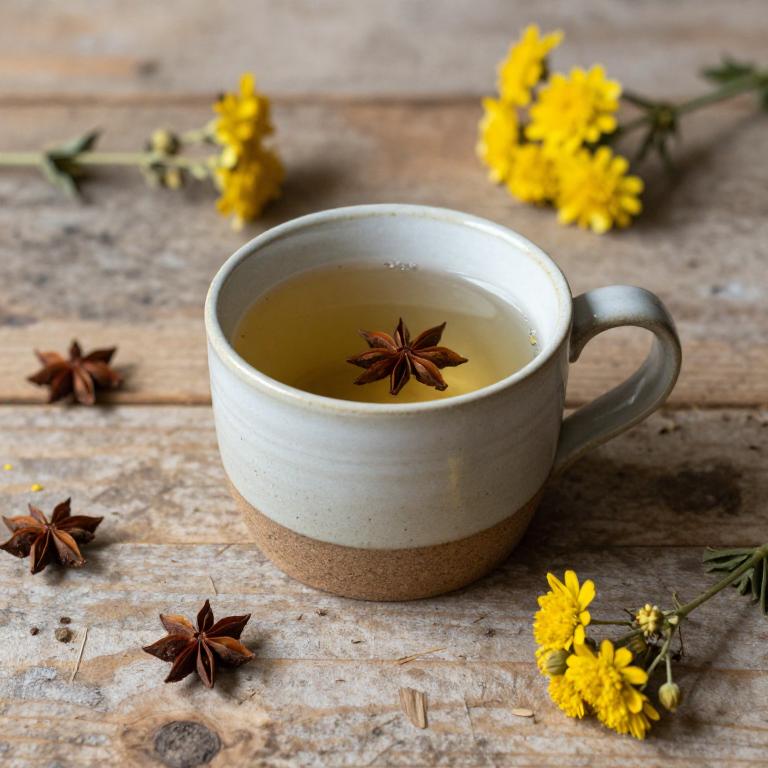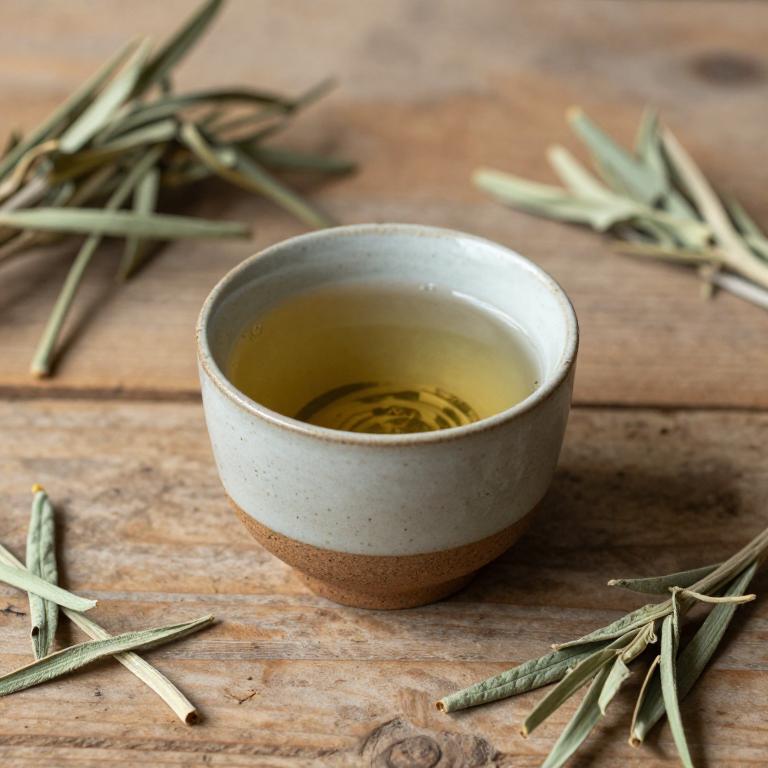10 Best Herbal Teas For Burping

Herbal teas can be a natural and soothing remedy for burping, as they often contain ingredients that help ease digestion and reduce gas buildup.
Peppermint and ginger are popular choices, as they can relax the muscles in the digestive tract and promote the expulsion of excess air. Chamomile and fennel are also beneficial, offering gentle anti-inflammatory and carminative properties that may alleviate discomfort associated with burping. Drinking herbal teas in moderation can support overall digestive health without the side effects of over-the-counter medications.
Incorporating these teas into a daily routine may offer long-term relief for those who frequently experience burping.
Table of Contents
- 1. Fennel (Foeniculum vulgare)
- 2. Cumin (Cuminum cyminum)
- 3. Peppermint (Mentha piperita)
- 4. Camellia (Camellia sinensis)
- 5. Rosemary (Rosmarinus officinalis)
- 6. Anise (Pimpinella anisum)
- 7. Licorice (Glycyrrhiza glabra)
- 8. Thyme (Thymus vulgaris)
- 9. Lemon grass (Cymbopogon citratus)
- 10. Chamomile (Matricaria chamomilla)
1. Fennel (Foeniculum vulgare)

Foeniculum vulgare, commonly known as fennel, is a popular herb used in herbal teas to help alleviate symptoms of burping.
The tea is made by steeping the seeds or leaves of the fennel plant in hot water, releasing its aromatic and digestive properties. Fennel contains compounds like anethole and flavonoids, which can help relax the gastrointestinal tract and reduce gas buildup. It is often recommended for individuals experiencing frequent burping due to indigestion or bloating.
Regular consumption of fennel tea may support overall digestive health and provide natural relief from discomfort associated with excess gas.
2. Cumin (Cuminum cyminum)

Cuminum cyminum, commonly known as cumin, is a popular herb used in herbal teas to help alleviate symptoms of burping.
The essential oils in cumin, such as limonene and cineole, are believed to aid in reducing excess gas and promoting digestion. When brewed into a warm tea, cumin can soothe the digestive system and ease discomfort caused by frequent burping. Its warming properties may also help relax the muscles in the stomach and intestines, further reducing gas buildup.
While cumin tea is generally safe for most people, it is advisable to consult a healthcare professional if burping persists or is accompanied by other symptoms.
3. Peppermint (Mentha piperita)

Mentha piperita, commonly known as peppermint, is a popular herb used in herbal teas to help alleviate symptoms of burping.
The essential oils in peppermint, particularly menthol, have a soothing effect on the digestive system and can help reduce excess gas and bloating. Drinking peppermint tea can relax the muscles of the gastrointestinal tract, making it easier for gas to pass and reducing the frequency of burping. It is often recommended for individuals experiencing digestive discomfort or acid reflux.
However, it is important to consume peppermint tea in moderation, as excessive intake may cause heartburn or other side effects in some individuals.
4. Camellia (Camellia sinensis)

Camellia sinensis, the plant from which green, black, and white teas are derived, contains compounds that may influence digestive processes and potentially contribute to burping.
The caffeine and polyphenols in these teas can stimulate gastric secretions, leading to increased stomach acid and gas production, which may result in burping. However, some individuals find that herbal teas made from Camellia sinensis, such as green tea, can soothe the digestive tract and reduce bloating. It is important to note that the effect of Camellia sinensis teas on burping can vary depending on individual tolerance and the specific type of tea consumed.
For those experiencing frequent burping, moderation in tea consumption and consulting a healthcare professional may be advisable.
5. Rosemary (Rosmarinus officinalis)

Rosmarinus officinalis, commonly known as rosemary, is a versatile herb often used in herbal teas to aid digestion and alleviate symptoms like burping.
The essential oils in rosemary, particularly cineole and camphor, have antispasmodic properties that can help reduce gas and bloating, common causes of burping. When brewed into a tea, rosemary can soothe the digestive tract and promote the movement of food through the stomach, minimizing the likelihood of excess air being swallowed. This herb is also known to improve appetite and reduce nausea, making it a beneficial addition to a digestive wellness routine.
However, it is important to consume rosemary tea in moderation, as excessive intake may cause stomach irritation or interact with certain medications.
6. Anise (Pimpinella anisum)

Pimpinella anisum, commonly known as anise, is a popular herb used in herbal teas to help alleviate symptoms of burping.
The essential oils in anise, particularly anethole, have mild carminative properties that can help reduce gas and ease bloating. When brewed into a warm tea, anise can soothe the digestive system and promote the expulsion of excess air from the stomach. Many people find that drinking anise tea after meals can significantly reduce the frequency of burping.
However, it is advisable to consult a healthcare professional before using anise tea, especially for individuals with existing digestive conditions or allergies.
7. Licorice (Glycyrrhiza glabra)

Glycyrrhiza glabra, commonly known as licorice root, is a popular herbal ingredient used in teas to help alleviate symptoms of burping.
This herb is valued for its anti-inflammatory and soothing properties, which can ease the discomfort associated with excess gas and acid reflux. When brewed into a tea, licorice root may help reduce the production of stomach acid and promote easier digestion, thereby minimizing burping. It is often combined with other herbs like ginger or fennel to enhance its digestive benefits.
However, individuals with hypertension should use licorice root cautiously, as it may have a mild effect on blood pressure.
8. Thyme (Thymus vulgaris)

Thymus vulgaris, commonly known as thyme, is a popular herb used in herbal teas to aid in digestion and reduce symptoms like burping.
The essential oils in thyme, particularly thymol, have antimicrobial properties that can help combat gas-causing bacteria in the stomach. When brewed into a soothing tea, thyme can soothe the digestive tract and ease bloating and excess gas. It is often recommended for individuals experiencing frequent burping due to indigestion or a sluggish digestive system.
Regular consumption of thyme herbal tea may promote better digestion and reduce the occurrence of burping.
9. Lemon grass (Cymbopogon citratus)

Cymbopogon citratus, commonly known as lemon grass, is a popular herbal tea used to alleviate symptoms of burping due to its soothing and anti-inflammatory properties.
This aromatic herb contains compounds like citral and myrcene, which help reduce gas and ease digestive discomfort. Lemon grass tea can help relax the muscles in the gastrointestinal tract, promoting smoother digestion and reducing the frequency of burping. It is often recommended as a natural remedy for individuals experiencing bloating or excessive gas.
To prepare the tea, simply steep a few fresh or dried lemon grass stalks in hot water for several minutes, and enjoy it warm for best results.
10. Chamomile (Matricaria chamomilla)

Matricaria chamomilla, commonly known as chamomile, is a popular herbal tea often used to alleviate digestive discomfort, including burping.
Its calming properties help reduce excess gas and bloating, which can contribute to frequent burping. Chamomile tea works by soothing the gastrointestinal tract and promoting healthy digestion. It is typically consumed warm, either on its own or with a bit of honey for added comfort.
Regular consumption of chamomile tea may help manage burping symptoms, though it is best used as part of a holistic approach to digestive health.